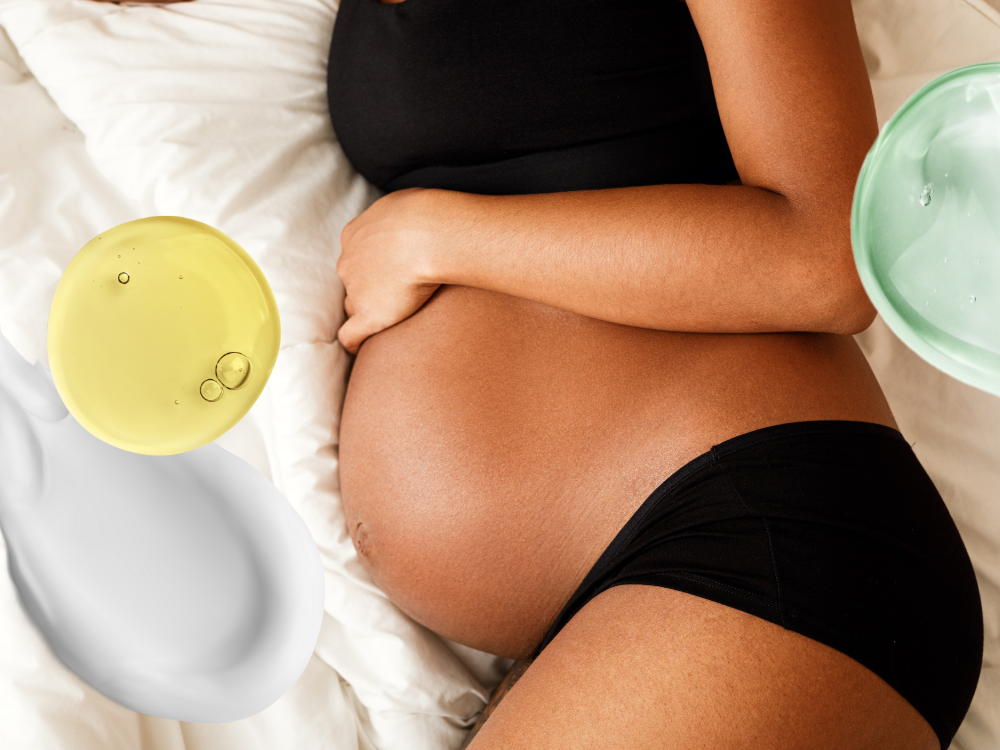
As you apply serums, creams, and lotions each day, you might not always think about what absorbs into your body. While many products fall under pregnancy safe skin care, others demand closer examination. Products with higher absorption rates, especially powerful medications, require careful evaluation during pregnancy and nursing. Below, we highlight ingredients that people often question regarding their safety during pregnancy and breastfeeding.
Retinoids
Can you use retinol while pregnant? The answer is no. Retinoids, commonly found in anti-aging skincare, treat wrinkles, fine lines, and acne by speeding up cell turnover and boosting collagen. Several reports directly link topical tretinoin (a retinoid) to birth defects. Additionally, oral retinoids like isotretinoin (Accutane) have caused severe birth defects. Because of these risks, retinol pregnancy safety concerns are serious. You must strictly avoid using retinol during pregnancy and retinol while pregnant to protect your baby’s health.
What to look for on the label:
-
Differin (adapalene)
-
Retin-A, Renoval (tretinoin)
-
Retinoic acid
-
Retinol
-
Retrinal
-
Retinal
-
Retinyl linoleate
-
Retinyl palmitate
-
Retinaldehyde
-
Tazorac (Tazarotene)
Is retinol safe during pregnancy? No—it should be completely avoided for pregnancy safe skincare routines.
Salicylic Acid
Salicylic acid commonly treats acne by reducing inflammation and redness. As a member of the aspirin family, it offers anti-inflammatory benefits. However, experts continue to debate salicylic acid pregnancy safety. High oral doses have caused birth defects, while small topical amounts generally pose a lower risk. Still, using salicylic acid during pregnancy, especially in peels or high concentrations, raises concerns. For the safest pregnancy skin care routine, we recommend avoiding salicylic acid whenever possible.
What to look for on the label:
-
Salicylic acid
-
Beta hydroxy acid (BHA)
Can you use salicylic acid while pregnant? Preferably not. Is salicylic acid pregnancy safe in small doses? Possibly, but it’s better to avoid unless medically advised. Also, salicylic acid breastfeeding considerations mirror those during pregnancy.
Topical Antibiotics and Acne Agents
Topical clindamycin and erythromycin are acne treatments that are generally safe during pregnancy and nursing. These are common options for pregnancy safe acne treatment. Benzoyl peroxide is another topical agent with minimal absorption. Thus, benzoyl peroxide pregnancy use is generally deemed safe in small amounts. When it comes to acne, options like azelaic acid pregnancy treatments are often recommended instead of harsher ingredients.
Glycolic Acid
Glycolic acid is frequently found in skincare products targeting acne and aging. Is glycolic acid safe during pregnancy? Studies are limited, but minimal absorption makes topical use likely safe. Therefore, small amounts of glycolic acid pregnancy products can be cautiously used. Can you use glycolic acid while pregnant? Yes, in moderation, and preferably under dermatologist supervision.
Hyaluronic Acid
Hyaluronic acid pregnancy use is widely considered safe. Hyaluronic acid helps hydrate skin and poses minimal risk during pregnancy. Is hyaluronic acid safe for pregnancy? Yes. It is a core ingredient for pregnancy safe face moisturizer products. Can you use hyaluronic acid while pregnant? Absolutely—it’s excellent for hydration without systemic absorption.
Niacinamide
Niacinamide, a form of Vitamin B3, offers anti-inflammatory and brightening benefits. Niacinamide pregnancy safety is high, making it ideal for pregnancy skin care routines. Is niacinamide safe during pregnancy? Yes. It’s a recommended choice for improving skin tone safely during this time.
Soy
Soy-containing skincare products are generally considered safe during pregnancy. However, they can worsen melasma (“pregnancy mask”) due to their estrogen-like effects. Thus, monitor your soy intake carefully if pigmentation is a concern.
What to look for on the label:
-
Lecithin
-
Phosphatidylcholine
-
Soy
-
Textured vegetable protein (TVP)
Hair Removers
Hair removal creams and bleaching agents are generally safe unless you’ve had prior allergic reactions.
What to look for on the label:
-
Potassium Thioglycolate (depilatory)
-
Calcium Thioglycolate (depilatory)
-
Sodium Hydroxide (minimizer)
-
Sanguisorba Officinalis Root Extract (minimizer)
-
Hydrolyzed Soy Protein (minimizer)
Skin Lighteners
Hydroquinone is commonly used to treat melasma but is not recommended during pregnancy.
Absorption rates are high, increasing systemic exposure risks. Thus, skip hydroquinone to maintain pregnancy safe skincare standards.
Sunscreens
Sunscreens are essential during pregnancy to protect against UV damage and melasma. Sunscreen safe for pregnancy should ideally include:
- Titanium dioxide
- Zinc oxide
Chemical sunscreens with oxybenzone and similar agents are controversial. Thus, mineral-based sunscreens are best.
Self-Tanners
Self-tanning products use DHA (dihydroxyacetone), which minimally absorbs into the body. Thus, self-tanners are considered safe during pregnancy and nursing. Still, avoid inhaling spray tans and apply in well-ventilated areas.
Vitamin C
Can you use vitamin C serum while pregnant? Yes! Vitamin C is an antioxidant that brightens and protects skin, making it safe and beneficial for pregnancy.
Shop our favorite skincare and more on Derm to Door.com!
Head back to our blog here!


